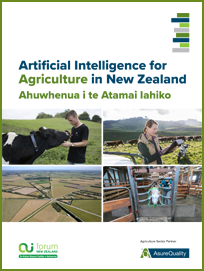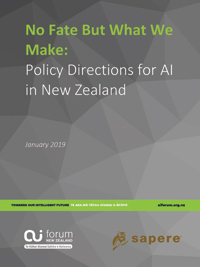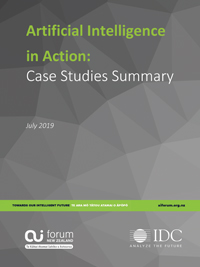Towards Our Intelligent Future
Te Ara mō tātou Atamai o Āpōpō
Direct Download (free)
The full report is available for free download in PDF format.
Order a Limited Printed Edition
This report has been designed as a soft cover book, sized at 180mm x 240mm, with 180 pages of content and produced using the latest digital print technology onto sustainably sourced paper.
Our 2019 research programme, Towards Our Intelligent Future is a collaborative initiative to encourage the adoption of artificial intelligence (AI) and harness its potential for a thriving future New Zealand.
This report series is the output of the AI Forum’s 2019 research programme and represents over 9 months of collaborative work on parallel streams exploring AI adoption, policy and strategy in New Zealand and around the world. The research clearly highlights the value of AI for achieving New Zealand’s wellbeing, sustainability and economic goals.
The report provides a showcase of local AI case studies, analysis of what’s needed to boost acceptance and adoption, and a first examination of Māori attitudes, perceptions of and engagement with AI.
Towards Our Intelligent Future follows the 2018 report Artificial Intelligence – Shaping a Future New Zealand. Last year’s analysis of the potential impact of AI for New Zealand identified six major recommendations, notably the importance of forging a coordinated national AI strategy.
To date, this has not been forthcoming and, while a long term strategic approach is still critically important, Towards Our Intelligent Future advocates for urgent action to begin applying AI to New Zealand’s highest priority goals.

Artificial Intelligence for Financial and Insurance Services in New Zealand
Ahumoni me te Inihua i te Atamai Iahiko
This report examines the New Zealand financial services, banking and insurance sectors, which are currently experiencing significant transformation.
Already, AI-enabled improvements are proving valuable and creating relatively rapid returns on investment. AI-driven technologies will be critical to the industry’s reinvention in creating simple, transparent and personalised digital experiences.
Despite regulatory hurdles, talent challenges and industry maturity, AI for financial services is a strong area of opportunity for New Zealand.
The research shows New Zealand urgently needs to increase its focus on an AI-enabled future, particularly investment, skills and talent, research, trusted data, strategy and regulation. The report calls for more strategic collaboration, involving partnerships with diverse stakeholders including InsurTechs, FinTechs and wider Government led AI strategy.
With increased levels of investment and effective regulation, AI-driven innovation can help make the New Zealand financial services industry nimbler, customer driven and more effective.
Direct Download (free)
The full report is available for free download.
Note: the file size is 4.5 MB.

Artificial Intelligence for Agriculture in New Zealand
Ahuwhenua i te Atamai Iahiko
This report examines the New Zealand and international AI industry landscapes for agriculture and investigates AI’s potential impacts for New Zealand’s place in the global food value chain.
The research shows New Zealand urgently needs to increase its focus on the core foundations needed to operate in an AI enabled future, particularly using data throughout the food value chain, not just behind the farmgate.
Agriculture and horticulture play a dominant role in New Zealand’s economy with food exports – dairy products, meat, fruit, wine, fish and seafood – making up around 40% of New Zealand’s $80 billion annual exports.
However, the agriculture sector continues to face significant ongoing challenges including climate change, low productivity growth, labour shortages, increasing regulation and environmental sustainability, the report says.
The report identifies how AI can be used in diverse use cases throughout the food supply chain: yield optimisation, addressing labour shortages, meat alternative research, food quality assurance, isolating disease outbreaks in animals and plants, waste reduction, biosecurity and conversion efficiency. AI technologies can also be applied to reducing the environmental impact of agriculture in New Zealand and supporting more sustainable practices. AI is 21st century agriculture’s “number 8 wire”.
Direct Download (free)
The full report is available for free download.
Note: the file size is 3.8 MB.

Artificial Intelligence for Health in New Zealand
Hauora i te Atamai Iahiko
This report identifies the health sector in New Zealand is facing challenges. These include increasing demand, rising consumer expectations, and the pressures of an ageing population. These factors are straining the health workforce, increasing costs and limiting access to care.
AI promises to bring significant clinical, workforce and cost benefits to the health sector, as well as personalise medical care. It can help with predicting disease and injury; and mine vast quantities of literature for research insights.
It can also assist in novel drug discovery; augment the work of human specialists through image analysis and robotic surgery; automate hospital processes; free up more time for doctor-patient interaction and provide personalised treatment.
Direct Download (free)
The full report is available for free download. You’ll be redirected to an external site where you can download the file in PDF format. Note: the file size is 2.5 MB.

Towards Our Intelligent Future: An AI Roadmap for New Zealand
Te Ara mō tātou Atamai o Āpōpō – Te hurahi atamai iahiko ō Aotearoa
This report identifies that New Zealand urgently needs to increase its focus on the core foundations needed to operate in an AI enabled future – particularly investment, skills and talent, research, trusted data, ethics and regulation. The report also shows how AI enabled solutions can be used to improve wellbeing, productivity and sustainability.
The report aims to:
- stimulate momentum towards national investment in AI to achieve high priority objectives
- analyse key enablers to support AI adoption in Aotearoa
- provide a first examination of Māori attitudes, perceptions and engagement with AI
- provide case studies of AI in action across our economy and society.
Direct Download (free)
The full report is available for free download. You’ll be redirected to an external site where you can download the file in PDF format. Note: the file size is 69.5 MB.
Order a Limited Printed Edition
This report has been designed as a soft cover book, sized at 180mm x 240mm, with 180 pages of content. Produced using the latest digital print technology onto sustainably sourced paper.
Principal Project Partners
The AI Forum of New Zealand would like to extend our sincere gratitude for the generosity of all the Project Partners and Supporters who have made this report possible.

Supporting Research Notes:

No Fate But what we make: Policy Directions for AI in New Zealand
Hayden Glass, January 2019

AI technologies will have very big impacts on New Zealand’s economy and society. Credible estimates say that the changes brought by AI will be as significant as the ongoing changes that have brought computers and internet into all aspects of business, government and everyday life over the last thirty years.
Generally New Zealand will be a taker not a maker of AI technologies. The scale of the impacts, both positive and negative, and the speed with which they appear will depend on how quickly and deeply organisations of all kinds absorb and adopt AI technologies.
The New Zealand Government has yet to formally begin work. One question is how quickly New Zealand wants to move on adoption of AI into the economy and society relative to other places. We present some high-level options for responses in this paper based partly on the strategies of other countries.

Artificial Intelligence in New Zealand: Case Studies Summary
Monica Collier, July 2019

New Zealand AI deployments range from off-the-shelf chatbots to complex bespoke models. Vendors are finding success with more mature use cases such as chatbots, conversational AI and digital humans.
Other organisations are building their own bespoke AI solutions in-house. Spark says its AI use cases are niche and complex. It is better for Spark to use an internal talent pool than try to fit a vendor solution to its needs. Spark’s agile teams also experiment and innovate with AI, usually without vendor involvement. AgResearch designed its translational research project in part to help its cross functional team learn by doing. The proof-of-concept will inform a ‘buy vs build’ decision in the future.
New Zealand AI vendors and enterprises both say it is difficult to find the right skillsets for their teams. There are also problems accessing data; a critical component to train a machine learning model.
The benefits of deploying AI solutions vary depending on use case. The most quoted benefits are that AI can work 24/7 and be faster, more accurate and consistent than humans for specific tasks. These benefits enable operational efficiencies.
AI solutions can also improve revenue. Ambit says its conversational AI solution results in increased sales conversions. AI solutions can improve loyalty and advocacy. FaceMe says its digital humans bring ‘humanness’ into a digital customer experience. This improves customer advocacy.
The interviewed companies say there are three key prerequisites for success with AI. First, organisations’ customers should already be interacting with the company in a digital way. Second, the company must be able to expose the datasets required for the solution. Third, companies must be able to deploy security and privacy measures to maintain trust in the AI solution.
To view all case studies please see here.
Research Partners





